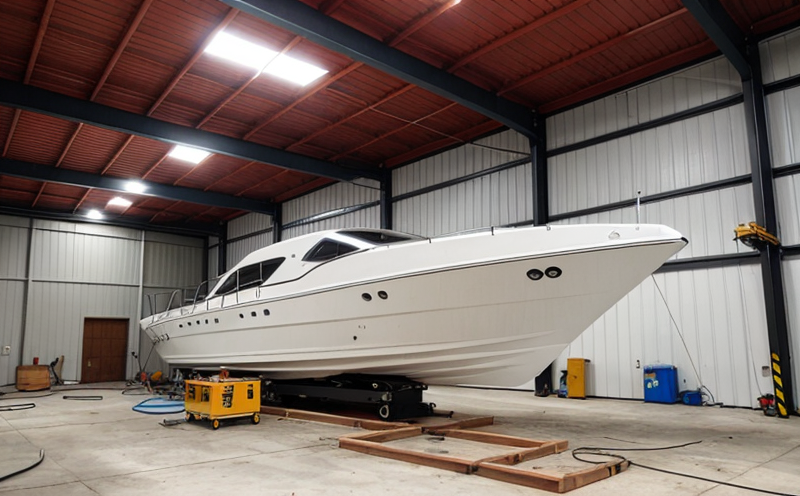ISO 4628 Weathering Testing of Ship Coatings
The ISO 4628 weathering testing protocol is a critical procedure in ensuring that ship coatings can withstand the harsh marine environment. This test evaluates how well paint and other protective coatings perform under simulated environmental conditions, including ultraviolet radiation, heat, humidity, salt spray exposure, and temperature cycling.
Marine environments are particularly challenging for coatings due to their constant exposure to a combination of factors that can degrade materials over time. The ISO 4628 protocol is designed to mimic real-world conditions experienced by ship coatings, such as prolonged exposure to sunlight, moisture, salt, and other corrosive elements. This testing helps manufacturers and quality managers ensure that the selected coating meets or exceeds industry standards for durability and longevity.
During ISO 4628 testing, samples are exposed to a series of environmental factors in a controlled laboratory setting. The test apparatus typically includes exposure chambers with programmable temperature control and humidity levels, as well as salt spray systems. The specimens undergo cycles that replicate the expected conditions at sea. This allows for accelerated aging and degradation analysis under controlled conditions.
The acceptance criteria for this testing are stringent, ensuring reliability and accuracy in the results. Compliance with ISO 4628 is essential for ensuring that coatings meet regulatory standards set by maritime authorities such as the International Maritime Organization (IMO). This certification can be a crucial factor in obtaining insurance coverage or meeting contractual requirements.
For quality managers and compliance officers, understanding the nuances of ISO 4628 testing helps in making informed decisions about material selection and supplier evaluation. R&D engineers benefit from this knowledge to design coatings that are more resilient under extreme conditions. Procurement teams can use these insights to specify coating materials with confidence, knowing they meet rigorous international standards.
| Environmental Factor | Test Conditions | Duration |
|---|---|---|
| Salt Spray Exposure | 5% NaCl solution at 35°C | 28 days |
| UV Light Exposure | 1000 J/m² (equivalent to 4 hours of sunlight) | 72 hours |
| Temperature Cycling | -5°C to +65°C | 24 cycles over 28 days |
The test results provide detailed data on the performance of the coating under various environmental conditions. These insights are valuable for quality managers and compliance officers in validating the effectiveness of new coatings or assessing existing materials. R&D engineers can use this information to refine their formulations, while procurement teams can ensure that they source only high-quality products.
- Enhanced durability
- Improved resistance to corrosion
- Increased lifespan of ship structures and equipment
- Better protection against marine biofouling
The ISO 4628 protocol is not just a test method but also a standard that sets the benchmark for quality in marine coatings. By adhering to this standard, manufacturers can ensure their products are reliable and meet stringent industry requirements.
Eurolab Advantages
At Eurolab, we bring unparalleled expertise and advanced technology to our ISO 4628 weathering testing of ship coatings. Our state-of-the-art facilities are equipped with the latest equipment, ensuring that every test is conducted under controlled conditions for accurate results.
- Comprehensive Testing Capabilities: We offer a full range of marine coating tests, from initial qualification to long-term durability studies.
- ISO 4628 Compliance: Our testing procedures strictly adhere to the ISO 4628 standard, ensuring that results are reliable and accurate.
- Accreditation: Eurolab is accredited by leading accreditation bodies, providing assurance of our quality standards.
- Detailed Reporting: We provide comprehensive reports with detailed analysis and recommendations for improvement.
Our team of experts has extensive experience in the marine industry, allowing us to offer tailored solutions that meet the specific needs of our clients. From initial consultation to final report, we ensure a seamless testing process.
Environmental and Sustainability Contributions
The ISO 4628 weathering test has significant environmental and sustainability contributions. By ensuring that coatings are durable and resistant to degradation, this testing helps reduce waste by extending the lifespan of ship structures and equipment. This minimizes the need for frequent replacements, thereby reducing resource consumption.
- Reduction in marine biofouling
- Increased energy efficiency due to better insulation properties
- Promotion of sustainable materials through rigorous testing standards
- Enhanced safety by preventing premature failures
The use of durable coatings also contributes to the reduction of greenhouse gas emissions, as ships equipped with high-quality coatings can operate more efficiently. This reduces fuel consumption and associated carbon footprints.
In addition, adhering to ISO 4628 standards ensures that materials are tested against some of the harshest conditions they will encounter in real-life scenarios. This helps in identifying potential issues early on, which can lead to cost savings by preventing costly repairs at sea or during maintenance intervals.
Use Cases and Application Examples
The ISO 4628 weathering test is widely used across various sectors within the marine industry. Here are some key use cases:
| Use Case | Application Example |
|---|---|
| Coating Qualification | New coatings being introduced to the market for the first time. |
| Lifecycle Assessment | Evaluating how well a coating maintains its properties over its entire lifecycle. |
| Supplier Evaluation | Determining the suitability of different suppliers' products based on their performance under harsh conditions. |
| Research and Development | Testing new formulations or modifications to existing coatings before commercialization. |
In addition, this test is crucial for compliance with international regulations and standards set by bodies like the IMO. This ensures that ships are equipped with materials that can withstand the extreme conditions they face at sea.





